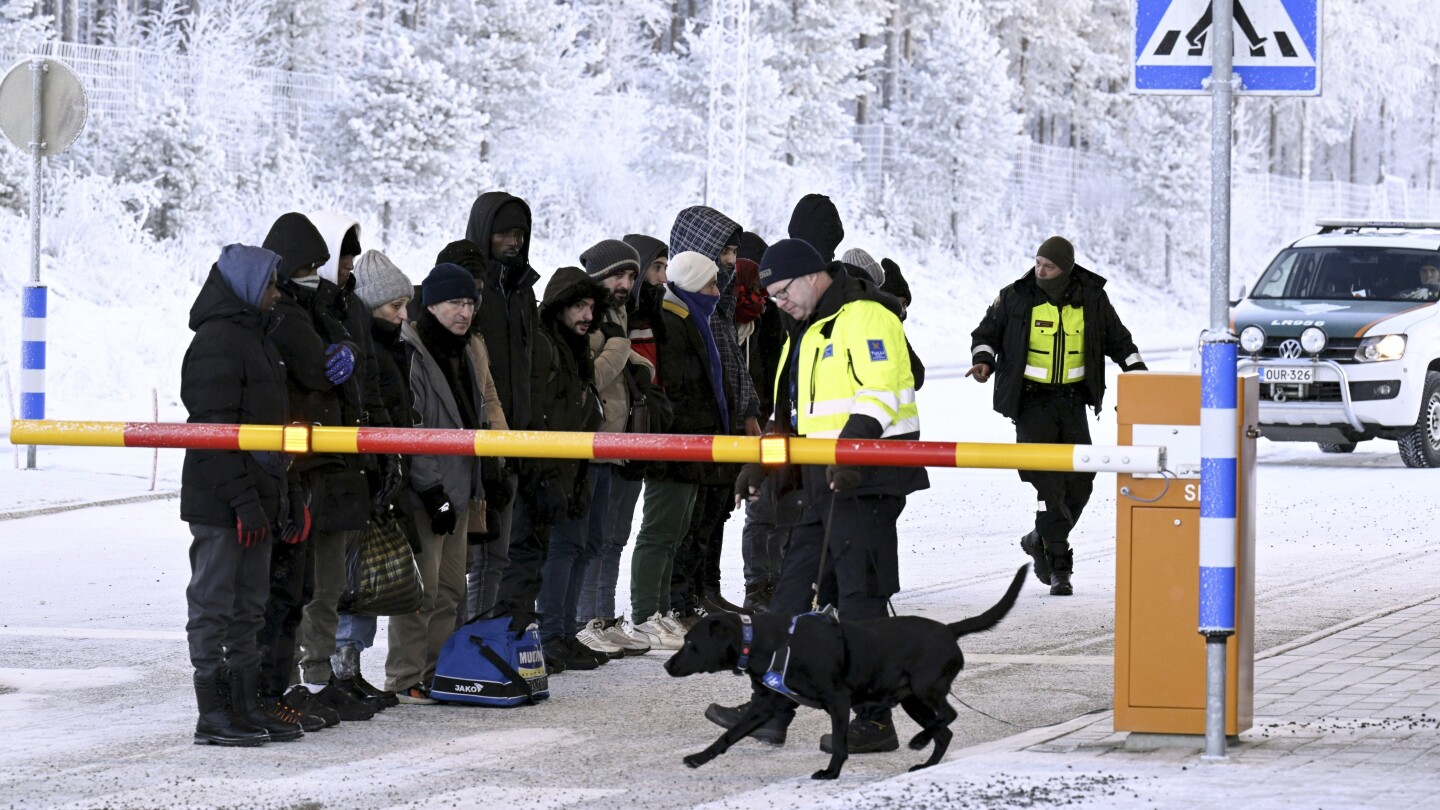HELSINKI (AP) — Finnish border guards and soldiers have begun erecting barriers including concrete obstacles topped with barbed-wire at some crossing points on the Nordic country’s lengthy border with Russia to better control the flow of undocumented migrants, officials said Wednesday. The Finnish government said it will close three more border crossing points, leaving only one Arctic point open for migrants seeking asylum.
Some 600 migrants without proper visas and documentation, mostly from the Middle East and Africa, have arrived in Finland in November compared to a few dozen in September and October. The arrivals include residents of Afghanistan, Iraq, Syria, Yemen, Kenya, Morocco and Somalia, border officials said.
“We need to do this to maintain order (at the crossing points) and guarantee the security of legal border traffic,” Tomi Tirkkonen, deputy commander of the Kainuu border guard district in eastern Finland, told The Associated Press.
The Kremlin has voiced regret about Finland’s decision to close the checkpoints and rejected Finnish authorities’ claims that Russia has encouraged the influx of migrants at the border to punish Finland for joining NATO.
Tirkkonen’s district monitors and surveils two of Finland’s nine crossing points on the border with Russia, which runs 1.340 kilometers (830 miles), serves as the European Union’s external border and makes up NATO’s northeastern flank.
The Finnish government decided to close four busy Russia border crossings in southeastern Finland last week over suspicions of foul play by Russia’s border officials.
Late on Wednesday, Prime Minister Petteri Orpo told reporters that measures taken on Nov. 16 “unfortunately haven’t been able to stop this phenomenon; on the contrary.”
He said the government would therefore close three more crossing points — Vartius, Kuusamo and Salla — and leave open only Raja-Jooseppi, Finland’s northernmost checkpoint with Russia.
It’s located about 1,100 kilometers (684 miles) north of the capital, Helsinki, and will remain, as of Saturday, the only Finnish crossing point that accepts asylum applications from migrants coming from Russia.
“Undoubtedly Russia is instrumentalizing migrants” as part of its “hydrid warfare” against Finland, said Finnish Foreign Minister Elina Valtonen on Wednesday. Finland joined NATO in April after decades of military non-alignment and pragmatic friendly relations with Moscow.
“We have proof showing that, unlike before, not only Russian border authorities are letting people without proper documentation to the Finnish border but they are also actively helping them to the border zone,” Valtonen said in an interview with The Associated Press on Wednesday.
Russian Foreign Ministry spokeswoman Maria Zakharova said Wednesday that Russian authorities are ready to work together with Finnish officials to reach an agreement on the border issue. She argued that Finland should have “put forward its concerns to work out a mutually acceptable solution or receive explanation,” she said.
On Monday, the Russian Foreign Ministry summoned the Finnish ambassador in Moscow to lodge a formal protest over the closure of the most actively used checkpoints on the border.
Some 30-70 migrants have been arriving each day at the Vartius checkpoint in Kainuu and the Salla checkpoint in Finland’s Arctic Lapland region, where winter conditions include minus 20-degree Celsius (minus 4 Fahrenheit) temperatures and plenty of snow.
Andrei Chibis, governor of Russia’s northern Murmansk region that borders Finland, on Wednesday posted pictures of migrants in a tent near the Salla checkpoint set up by the regional authorities to let them warm themselves up, eat and drink hot tea. He described the situation as a “humanitarian crisis” and blasted the Finnish authorities, saying “foreign citizens can’t cross the border” to the Finnish side.
Most of the migrants are young men in their 20s and 30s but some are families with children and women, border guard data and photos from news outlets indicate.
The number of migrants attempting to cross into Finland is unusually high and Orpo’s center-right government has accused Moscow of deliberately ushering migrants to the Russia-Finland border zone that is normally under heavy control by Russia’s Federal Security Service, or FSB.
“There’s been a remarkable change in Russia’s modus operandi” in regard to migrants and their movement on the Russia-Finland border, Tirkkonen said, adding that Finland is set to get some assistance from the EU’s border and coast guard agency Frontex to deal with the situation.
Finland, a nation of 5.6 million people, joined NATO in direct response to Russia’s war with Ukraine. Many interpret Moscow’s migrant maneuvers as a retaliation against Helsinki opting to join the Western military alliance but analysts say Russia’s primary motive for such as action remains unclear.
___
Follow AP’s coverage of global migration at https://apnews.com/hub/migration

